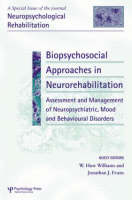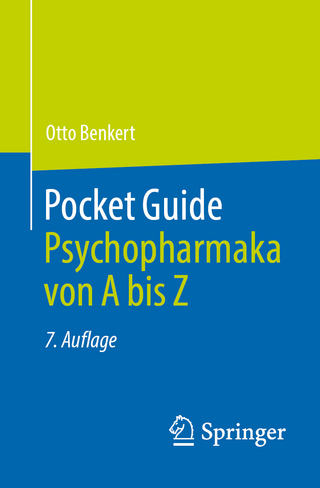
Biopsychosocial Approaches in Neurorehabilitation: Assessment and Management of Neuropsychiatric, Mood and Behavioural Disorders
Psychology Press Ltd (Verlag)
978-1-84169-945-5 (ISBN)
- Titel ist leider vergriffen;
keine Neuauflage - Artikel merken
There has been significant progress in the field of neurorehabilitation over the past twenty years, particularly in the assessment and management of cognitive impairment. More recently, the stakeholders in neurorehabilitation - clinicians, researchers, purchasers of services and clients - have become aware of the need to develop systems and services for managing the wide ranging psycho-social sequelae of acquired brain injury (ABI). Mood, behavioural and neuropsychiatric conditions have been found to be highly prevalent. Such disorders, at clinical or sub-clinical levels, are disturbing for clients themselves, and for their families, and present a challenge for enabling survivors to regain social roles. Many individuals also experience difficulties in related areas, such as pain management, drug and alcohol misuse, and in maintaining relationships. Given the wide-ranging psychological, psychiatric, health and social sequelae of ABI, rehabilitation services are often responding to people whose needs are complex and for which the evidence base for practice may be limited. In this Special Issue of Neuropsychological Rehabilitation, leading international experts provide reviews of current thinking on mood, behaviour and neuropsychiatric conditions, along with issues of drug and alcohol use, pain, sexuality and relationships after brain injury. Assessment and management issues are addressed, along with implications for service delivery in developed and in developing world contexts. This Special Issue will be invaluable to a wide range of neurorehabilitation professionals including clinical psychologists, neuropsychologists, speech and language therapists, occupational therapists, neurologists, neuropsychiatrists, clinical nurse specialists, physiotherapists, and case managers. The volume will also be of benefit to those planning or purchasing brain injury rehabilitation services.
W.H. Williams, J. Evans, Brain Injury and Emotion: An Overview to a Special Issue on Biopsychosocial Approaches in Neurorehabilitation. Section 1. Assessment. G.P. Prigatano, S.C. Johnson, The Three Vectors of Consciousness and Their Disturbances after Brain Injury. N.D. Zasler, M.F. Martelli, Mild Traumatic Brain Injury: Impairment and Disability Assessment Caveats. R.L. Tate, Impact of Pre-injury Factors on Outcome after Severe Traumatic Brain Injury: Does Post-traumatic Personality Change Represent an Exacerbation of Pre-morbid Traits? Section 2. Depression and Anxiety: 'Reactive' Disorders. S. Fleminger, D.L. Oliver, W.H. Williams, J. Evans, The Neuropsychiatry of Depression after Brain Injury. N. Khan-Bourne, R.G. Brown, Cognitive Behaviour Therapy for the Treatment of Depression in Individuals with Brain Injury. C. Code, M. Herrmann, The Relevance of Emotional and Psychosocial Factors in Aphasia to Rehabilitation. W.H. Williams, J.J. Evans, S. Fleminger, Neurorehabilitation and Cognitive Behaviour Therapy of Anxiety Disorders after Brain Injury: An Overview and a Case Illustration of Obsessive Compulsive Disorder. T.M. McMillan, W.H. Williams, R. Bryant, Post-traumatic Stress Disorder and Traumatic Brain Injury: A Review of Causal Mechanisms, Assessment and Treatment. Section 3. Behavioural Disorders and Health Status. L.A. Taylor, J.S. Kreutzer, S.R. Demm, M.A. Meade, Traumatic Brain Injury and Substance Abuse: A Review and Analysis of the Literature. S. Tyrer, A. Lievesley, Pain following Traumatic Brain Injury: Assessment and Management. N. Alderman, Contemporary Approaches to the Management of Irritability and Aggression following Traumatic Brain Injury. P. Eames, R.Ll. Wood, Episodic Disorders of Behaviour and Affect after Acquired Brain Injury. Section 4. Personal Relationships. M. Oddy, C. Herbert, Intervention with Families following Brain Injury: Evidence Based Practice. J. Ponsford, Sexual Changes Associated with Traumatic Brain Injury. Section 5. Community Services. P.J. Yates, Psychological Adjustment, Social Enablement and Community Integration following Acquired Brain Injury. T. Judd, Rehabilitation of the Emotional Problems of Brain Disorders in Developing Countries.
| Erscheint lt. Verlag | 27.3.2003 |
|---|---|
| Reihe/Serie | Special Issues of Neuropsychological Rehabilitation |
| Verlagsort | Hove |
| Sprache | englisch |
| Maße | 156 x 234 mm |
| Themenwelt | Geisteswissenschaften ► Psychologie ► Klinische Psychologie |
| Medizin / Pharmazie ► Medizinische Fachgebiete ► Neurologie | |
| Medizin / Pharmazie ► Physiotherapie / Ergotherapie ► Rehabilitation | |
| ISBN-10 | 1-84169-945-4 / 1841699454 |
| ISBN-13 | 978-1-84169-945-5 / 9781841699455 |
| Zustand | Neuware |
| Informationen gemäß Produktsicherheitsverordnung (GPSR) | |
| Haben Sie eine Frage zum Produkt? |
aus dem Bereich


